Toxoplasma gondii is a common parasite in humans, but exactly how it’s so good at spreading has been murky. Now scientists at Stockholm University have uncovered a sneaky Trojan horse technique that allows it to avoid the immune system.
Toxoplasma is a fascinatingly insidious parasite, which can be spread through infected food, soil or feces. While it can infect basically any warm-blooded animal, it has a special affinity for cats, since their intestines are the only place it’s comfortable enough to sexually reproduce. To help it get back to its favorite love shack, the parasite can infect the brains of mice and make them bolder, less likely to avoid cats and therefore more likely to be dinner.
This kind of host behavior modification might even be happening in humans. Recent studies have found that Toxoplasma infection is “a consistent, positive predictor of entrepreneurial activity,” possibly due to that same reduced aversion to risk. It even appears to make human hosts more attractive, because helping the host get lucky helps the parasite do the same.
With such a wide variety of host animals, Toxoplasma is an incredibly successful parasite. To scientists, that begs the question of how it avoids the immune system so well that it can even enter the brain of hosts, which is normally protected by the blood-brain barrier. In the new study, the Stockholm researchers identified a crafty mechanism that seems to be behind it.
Macrophages are immune cells that engulf foreign cells that shouldn’t be there, including microbes, cancerous cells, and in theory, parasites like Toxoplasma. Once they detect pathogens, macrophages usually stay put in a tissue to clear it out, while other immune cells like dendritic cells move around the body to rally the troops.
The team found that Toxoplasma infects macrophages by injecting them with a protein called GRA28. This changes the gene expression of the macrophage to look more like a dendritic cell. They also start to act like a dendritic cell, giving up their post in the infected tissue and migrating around the body much faster than macrophages are normally capable of.
“It is astonishing that the parasite succeeds in hijacking the identity of the immune cells in such a clever way,” said Professor Antonio Barragan, lead author of the study. “We believe that the findings can explain why Toxoplasma spreads so efficiently in the body when it infects humans and animals.”
While Toxoplasma is usually harmless, it can cause a dangerous, even potentially fatal disease called toxoplasmosis. And since 30 to 50% of the human population may be exposed to it or infected, it’s worth understanding it better.
The research was published in the journal Cell Host & Microbe.
Source: Stockholm University via Eurekalert




